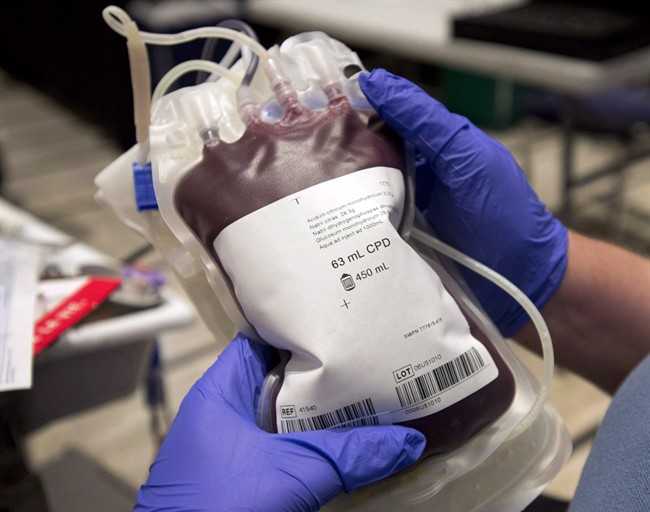New Canadian research suggests that weeks-old blood is just as good as fresh blood for transfusions in emergency settings.

While the medical community traditionally thought that fresh blood – less than a week old – may be better for patients, Ottawa scientists say that blood stored for about 22 days is just as effective. They hope their findings put donated blood, a limited supply, to better use.
Ottawa Hospital Research Institute scientists say that in the past few decades, doctors have been asking for fresh blood thinking it’s better for their patients. This trend puts a strain on blood banks.
READ MORE: What you should be eating to lower your blood pressure
“Blood transfusions are incredibly important – they can be lifesaving. They are used to replace blood loss during surgery and major trauma as well…we need to transfuse them to sustain blood flow to the tissues and oxygen delivery,” Dr. Dean Fergusson, an OHRI senior scientist, told Global News.
The shelf life for blood is currently 42 days. When blood is donated, it turns up in hospital and can sit in the blood bank for between 35 and 42 days.

Get weekly health news
For his research, Fergusson worked with researchers across Canada and Europe from 64 hospitals. Of 2,340 patients involved in the study, about 1,200 received fresh blood while another 1,200 received old blood. The scientists wanted to know if intensive care patients transfused with either types of blood fared better than their counterparts.
READ MORE: Canada’s baby boomers face ‘dangerous levels’ of high blood pressure: report
Turns out, there wasn’t a difference in risk of death or organ dysfunction between the two groups, regardless if patients suffered from medical trauma, needed blood post-surgery, or had to battle organ failure.
“If we found fresh blood was better, it would put an incredible pressure on the blood system to make sure they only collected and processed fresh blood and so our study alleviates those pressures,” Fergusson told Global News.
READ MORE: Blood thinner used by pregnant moms is ineffective, Canadian study says
“It sends the message that the current practices are most beneficial to patients – that we shouldn’t change our practice to use fresh blood in those instances where patients do need transfusions,” he explained.
Specifically, 423 patients died within 90 days after a transfusion from the group who received fresh blood. Almost 400 of their counterparts who received old blood died.
The Canadian research was published Tuesday morning in the New England Journal of Medicine. Read the full findings here.
carmen.chai@globalnews.ca
Follow @Carmen_Chai








Comments